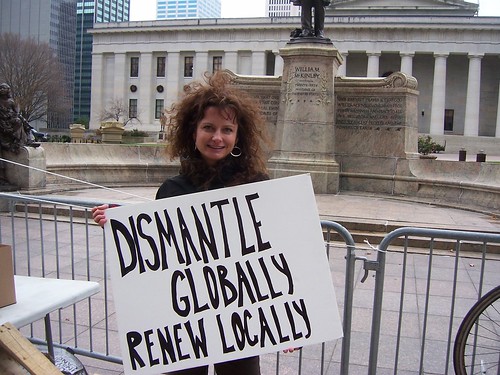
Jason Box is an associate professor of geography and atmospheric sciences at the Ohio State University. He was part of a protest on Nov.21 in front of the Columbus offices of Senator Rob Portman, one of six Republicans on the now defunct Super Committee.
“We stand here…calling for a reduction in oil subsidies. That connects with this issue of increasing reliance on fossil fuels at a time when that needs to decrease.”
Box said environmental issues are appropriately part of Occupy.
“The Occupy Movement and environmentalism go together because these are both justice movements. It’s economic justice and environmental justice.”
Box agreed this and other industrial societies can not quit fossil fuels cold turkey, but he said subsidies and other investments should support moving toward cleaner, renewable energy sources.
“ I hear proponents for hydro-fracturing talking about the urgency to invest in that technology. But that’s a carbon-intensive technology and it does other damage to the environment. Where is the rhetoric coming from industry about the need to invest in clean energy ? It’s pretty obvious that we need wind, solar, and even biofuels. These are the technologies that deserve subsidies and investment,” Box said.
Box agreed energy security is a real concern. But he said politicians often talk about that issue as a way to call for promoting fossil fuels, without including cleaner, more renewable sources of energy.
“It seems to me a win-win situation to invest in clean energy because that supplies the energy but it also doesn’t trash the planet. So, we need to join energy, environment, and economy in ways that are not exclusive of each other,” Box said.
Mark Bonfield and his wife Dawn are part of Occupy Anchorage. They were part of the Occupy Columbus protest in front of the office of Sen. Portman.

“Right now our oil economy is unsustainable. It’s destroying our environment. We’re too reliant on fossil fuels. We need to move away from that rather than continuing subsidies for oil companies and continuing wars for oil,” Bonfield said.
He said our nation and world needs to have policies for using resources sustainably.
“Without a strong land base, none of us are going to be able to survive.” Bonfield used the term ‘land base’ which the writers Derrick Jensen, Lierre Keith, and Aric McBay use often.
The three writers recently collaborated on a book called Deep Green Resistance, which its publisher, Seven Stories Press, describes on its website as “a manifesto and manual on how to build a resistance movement that will bring down industrial civilization and save the planet.”

(Dawn Bonfield after the demonstration gathered with about 20 others at the site of Occupy Columbus in front of the State House.)
Mark Bonfield said our nation needs to put money into creating jobs and locally based economies.
“We need to move toward local goods and services. We need organic agriculture. We need to make this a movement for the future rather than a movement for the past.”
As for specifics about tax subsidies for oil companies, he said, “there are about $18 billion in subsidies, but that doesn’t include the cost of the environmental damage and the cost of healthcare (from pollution) and of wars that we fight for oil. So, we’re spending billions--really trillions--of dollars on wars to enable markets for oil. We’re fighting these wars for corporations that are profiting off of the lives of young men and women of our country. Not only that, but we’re killing people internationally in countries such as Afghanistan and Libya and Iraq to steal their resources. We need to move away from that.”
Bonfield said the US should find ways to work with other countries instead of continuing with a system that is killing people for an unsustainable way of life. He said many of us don’t understand how much our economy and our way of life is based on oil.
He agrees industrial societies such as ours can’t quit oil and other fossil fuels immediately. But he said if we continue with tax subsidize for the oil industry, it shows the US is not even trying to take a step in a better direction.
“It ( a transition away from oil and other fossil fuels ) isn’t going to happen over night. But we need to start it now and we need to invest in that rather than putting these subsidies into companies that are making billions of dollars. I think Exxon made $10 billion this last quarter and Chevron $ 7 billion.”
He said there are alternatives to a fossil-fuel-based economy but that the fossil fuel industry and some politicians have tried to sell the public on the false choice of having jobs versus having a more environmentally sustainable economy.
“ There is a green economy that can move toward a sustainable world that is going to put people to work and that is going to be a livable way of going into the future.”
But he said lobbying from oil companies and other companies in the fossil fuel industry is standing in the way of this.
“They (oil companies) are spending millions of dollars to get billions of dollars. So their return is excellent. So they’re making a lot of profit as they buy our government. Right now, we have a government that is for sale to the highest bidder.”
Bonfield said that is silencing the voice of the vast majority of us who don’t have the money to lobby.
"Their polices are going against what the people want. No one wants to spend billions of dollars on war and no one wants to spend billions of dollars on these oil companies that are profiting off of it.”
Bonfield said Occupy will sooner or later broaden its focus so as to more consistently include environmentalism.
“The environmental movement and the movement against our destructive foreign policy is all interrelated with the Wall Street movement and the corruption of corporations,” Bonfield said.

Carson Sheir is someone who can be seen working with Occupy Columbus on an almost daily basis.

“ Basically, we are not targeting Republicans or Democrats. We are targeting legislators who have taken oil money in their coffers.”
Like Bonfield , Sheir said big oil companies should not be getting tax subsidies when they are making hundreds of millions, and in some cases, billions of dollars in profits. But Sheir was not as ready to embrace the idea of Occupy becoming more linked to environmental causes.
“ There are many different opinions on the environmental issue. Of course, we love the environment…but our concern is really not the environmental issues. It’s more the fact that they have refused to put oil subsidies on the bargaining table, yet they are talking about cutting job programs and social welfare programs.”
Sheir said the “eyes of the 99 percent” are on legislators. For Occupy Columbus, said Sheir, that applies especially to Democratic Senator Sherrod Brown and Republican Senator Rob Portman.
Sheir then shouted into the WCRS mic, as if it were the receiver of a phone with the senator on the other end of the call.
“If you do vote to continue oil subsidies, Senator Portman, we will work to unseat you. If you continue to represent big companies over the regular people, and if you continue to represent the one percent over the 99 percent, we the 99 percent vow to work nonstop to unseat you and send to Washington people who represent ordinary citizens and not the one percent.”






